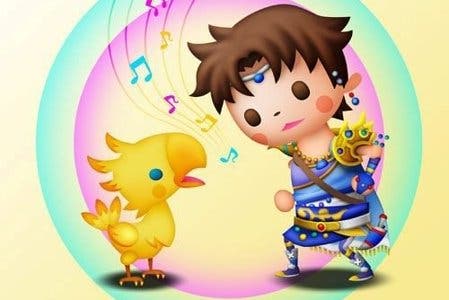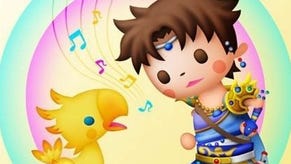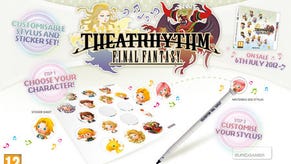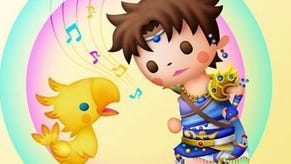Theatrhythm: Final Fantasy Review
Aeris guitar.
At first glance, Square Enix's decision to celebrate its treasured fantasy series' 25th birthday with a rhythm action game appears a curious one. The company has no experience making music games, while Final Fantasy itself, in its heft and epic sprawl, has nothing in common with a genre built upon three-and-a-half-minute pop foundations and an absence, rather than a surplus, of dialogue.
Beyond that, the collapse of the music game market following Rock Band's plastic oversaturation makes this an unfashionable choice as well as a disharmonious one. Final Fantasy may be a series filled with heroes, but not one has ever wielded a guitar.
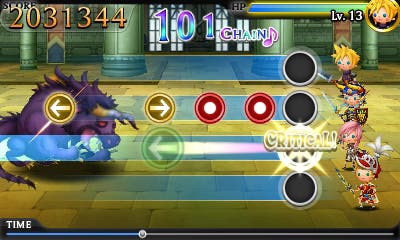
Play it, however, and the choice begins to make some sense. Nobuo Uematsu's melodies have anchored the series - from the tinkling arpeggio of the original's signature theme to the orchestral sweep and swagger of his most famous pieces, such as One-Winged Angel. If each Final Fantasy game is tethered to the brand by little more than a random collection of motifs - crystals, chocobos, a man named Cid - it's fitting, perhaps, that a celebration of the series should focus upon its strongest, most consistent unifying motif: its music.
Even so, this is an aesthetic tribute to Final Fantasy, not a systemic one. Lip service is paid to the role-playing games' fundamentals, but these elements are mostly surface-level. Beneath the protagonists, the hit points, the restorative items, the summon spells and the monsters sits a straightforward rhythm game that asks you to tap and swipe at the 3DS screen in time with the music.
The clue is in the name, an unwieldy contraction of 'theatre' and 'rhythm'. Match the songs' rhythms and you unlock the theatre: cut-scenes plucked from the originals, Punch and Judy approximations of Final Fantasy's heroes and heroines and dialogue snatched from 13 bestsellers' worth of material.
Ostensibly, the heart of the game is found in 'Series' mode. Here you select a team of four characters plucked from an initial choice of 13 before choosing one of the mainline series games and playing through three songs taken from the work. The on-screen indicators require a tap, slide or hold of the stylus to the rhythm of the music and, at times, you can feel like a tiny conductor. In contrast to the game's influences - from PaRappa the Rapper to Guitar Hero - successfully matching the indicated inputs doesn't trigger any instrument sounds. Rather, a sword clash sound effect triggers, rudely stomping over the music beneath (although the volume of this effect can be reduced or muted altogether).
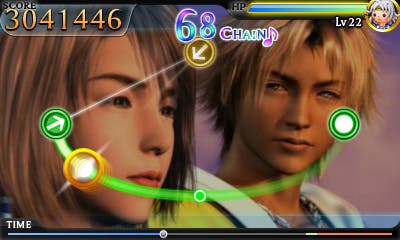
You're graded on the accuracy of your timing and the better you perform the piece, the more experience points you earn for your team and Rhythmia you earn at its conclusion. Rhythmia, a sort of meta-currency, unlocks bonuses at set thresholds: movies, collectable cards for a virtual album and crystals which, in time, unlock new characters. When you've collected 10,000 Rhythmia points across the entire game, the main 'campaign' is complete.
With just 39 tunes in the Series mode, the game initially seems undernourished. But head to the 'Chaos Shrine' and you can unlock new songs, no fewer than 99 sets comprised of two pieces of music per performance. These are unlocked one at a time or through trading with other players across StreetPass, but it's nevertheless a generous addition that ensures Theatrhythm feels like a true celebration rather than a slim cash-in (although not being able to filter this discography by game or composer is irritating).
Songs are divided into three categories, although these types only vary visually. BMS are fast, up-tempo pieces, the four characters in your party standing in a line to the right of the screen as if battling a foe in the 8- and 16-bit Final Fantasy titles. FMS are relaxed 'field' songs, and for these you see just your party leader travelling as if across a sprawling landscape in search of items and adventure. Finally, EMS are the 'emotional, event' songs, during which cut-scenes pulled from the original games play out in the background. The game plays identically in each case.
"The music conjures what we felt when Cecil was betrayed in an arson attack, when Celes contemplated suicide on the cliff top, when Cloud held Aerith limp in his arms..."
Beneath the style and the endless ticker-tape of scaling experience points, there is something melancholic here - an ode to a series that has, arguably, lost its way. Mapped out on the stage screen we can see in plain view the progression of the Final Fantasy lineage, through the stuttering pixels of its formative years and the boastful, innocent CGI bluster of the PlayStation era up to today. Final Fantasy 13 sits at the end of the timeline as something on an anomaly. Its melodies are out of step with the Final Fantasy orchestra, as if the tiller of creative vision is flapping madly from side to side in the absence of Nobuo Uematsu's firm grip.
It's all there, laid out in song. We see the progression of a series through technical advance and accomplishment. We see the peaks and troughs of story and the accompanying dips and rises in creative coherence.
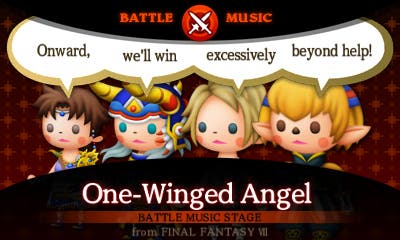
Yes, this is a greatest hits of sorts - a holiday TV show, picking out those best-loved scenes from 25 years of fantasy soap. But it's also a document of creative rise and fall and rise, charting those points when the series had clarity of vision and those moments when it had no idea what it was aside from a clutch of worn motifs. In that sense, Theatrhythm: Final Fantasy is the most honest anniversary collection yet in the current crop of formative Japanese series celebrating that significant birthday - a feat it manages in a genre that has nothing to do with the source material.
Final Fantasy is a series about journeys and, through those journeys, story. We have travelled those paths and we don't need to do so again. But the music? The music conjures what we felt when Cecil was betrayed in an arson attack, when Celes contemplated suicide on the cliff top, when Cloud held Aerith limp in his arms, when Squall and Rinoa danced through the ballroom, when Vivi married Quina, and when Tidus kissed Yuna.
Theatrhythm: Final Fantasy is a simple music game. But, for someone who grew up with these myths wallpapering their imagination, it is a complex vehicle for emotion. Final Fantasy may be a loose, somewhat obnoxious umbrella term for a collection of games of mixed message and quality, but Theatrhythm succeeds in touching upon some true magic within its bounds.
